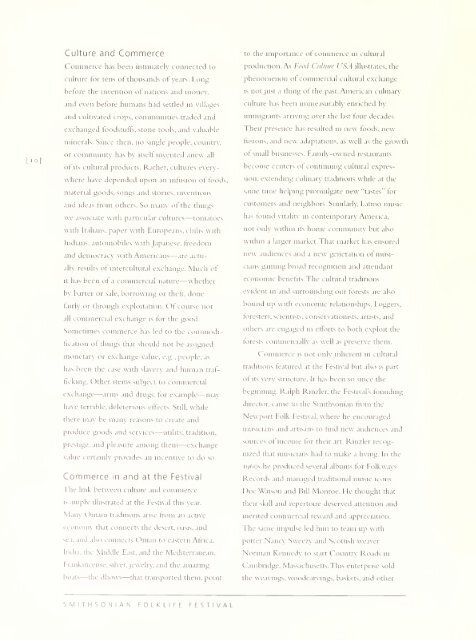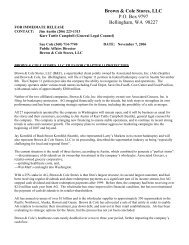Smithsonian - Perishable Pundit
Smithsonian - Perishable Pundit
Smithsonian - Perishable Pundit
You also want an ePaper? Increase the reach of your titles
YUMPU automatically turns print PDFs into web optimized ePapers that Google loves.
Culture and CommerceCommerce has been intimately connected toculture for tens of thousands of years. Longbefore the invention of nations and money,to the importance of commerce in culturalproduction. As Food Culture USA illustrates, thephenomenon of commercial cultural exchangeisnot just a thing of the past. American culinaryand even before humans had settled invillagesculture has been immeasurably enriched byand cultivated crops, communities traded andimmigrants arriving over the last four decades.exchanged foodstuffs, stone tools, and valuableTheir presence has resulted innew foods, new10]minerals. Since then, no single people, country,or community has bv itself invented anew allof itsfusions, and new adaptations, as well as the growthof small businesses Family-owned restaurantsbecome centers of continuing cultural expréscultural products. Rather, cultures everywherehave depended upon an infusion of foods,sion, extending culinary traditions while atthematerial goods, songs and stones, inventionssame time helping promulgate new "tastes" forand ideas from others. So main1of the thingscustomers and neighbors. Similarly, Latino musicwe associate with particular cultures— tomatoeshas found vitality in contemporary America,with Italians, paper with Europeans, chiliswithnot only within its home community but alsoIndians, automobiles with fapanese, freedomwithin a larger market. That market has ensuredand democracy with Americans—areactu-new audiences and anew generation of musi-ally results of intercultural exchange. Much ofit has been of a commercial nature—whetherby barter or sale, borrowing or theft, donecians gaming broad recognition and attendanteconomic benefits. The cultural traditionsevident in and surrounding our forests are alsofairlyor through exploitation. Of course notbound up with economic relationships I oggers,all commercial exchange is tor the good.Sometimes commerce has led to the commodificationof things that should not be assignedmonetary or exchange value, eg .people, ashas been the case with slavery and human trafficking.Other items subject to commercialforesters, scientists, conservationists, artists, andothers are engaged in efforts to both exploit theforests commercially as well as preserve themCommerce is not only inherent in culturaltraditions featured at the Festival but also is partof its very structure. It has been so since theexi hinge—arms and drugs, for example—maybeginning. Ralph Rmzler, the Festival'sfoundinghave terrible, deleterious effects. Still, whilethere may be main' reasons to create andproduce goods and services— utility, tradition,prestige, and pleasure among them— exchangevalue certainly provides an incentive to do so.Commerce inand at the FestivalThe link between culture and commerceisamply illustrated at the Festival tins year.Many Omani traditions arise from an activeeconomy that connects the desert, oasis, andsea, and also connects C 'man to eastern Africa,India, the Middle East, and the Mediterranean.Frankincense, silver, jewelry, and the amazingboats— the dhows—that transported them, pointdirector, came to the <strong>Smithsonian</strong> from theNewport Folk Festival, where he encouragedmusicians and artisans to find new audiences andsources of income tor their art. Rmzler recognizedthat musicians had to make a living. Inn;oos he produced several albums for FolkwaysRecords and managed traditional music iconsDoc Watson and Dill Monroe. He thought thattheir skill and repertoire deserved attention andmerited commercial reward and appreciationFhe same impulse led him to team up withpotter N.mcN Sweezy and Scottish weaverNorman Kennedy to start Country Roads mCambridge, Massachusetts. This enterprise soldthe weavings, woodcarvings, baskets, ,\nd othertheSMITHSONIAN FOLKLIFE FESTIVAL








